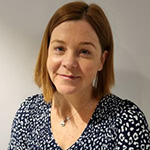Stroke Foundation National Guidelines Update: Sleep disorders and carer support
Tuesday 17 June 2025, 2–3 pm AEST
Presented by Heidi Li, Assoc. Prof. Elizabeth Lynch, Dr Sharon Kramer, and facilitated by Melita Stirling
Join the Stroke Foundation National Guidelines Updates webinar to hear about the latest changes to the Living Clinical Guidelines for Stroke Management in the areas of sleep disorders and carer support.
The webinar will cover the following:
- Changes to the recommendations for sleep disorders
- Updates to the recommendations for carer support
- How changes or recommendations can be implemented in practice
- Practical considerations or suggestions for stroke care
- Q & A and discussion.
Please join us for what will be an informative webinar. We encourage all health professionals and researchers working within stroke care to attend.
About the presenters

Heidi Li first joined Stroke Foundation as volunteer, and following completing her degree in Biomedical Science, she has been working on the Stroke Living Guidelines.
She is currently the Stroke Guidelines Coordinator, managing the process and updates to the guidelines.

Sharon Kramer is a postdoctoral researcher at Monash University. Her research program focuses on exercise programs for stroke patients.
Sharon has a background in physiotherapy and her broad research interests include the role of exercise in stroke recovery, and post-stroke fatigue and sleep management.

Associate Professor Elizabeth Lynch is a physiotherapist and full-time researcher at Flinders University in South Australia.
Liz co-chairs the Australian and New Zealand Stroke Clinical Guidelines working group, and much of her research is focused on investigating implementation of evidence and exploring ways to improve life after stroke, working closely with people with lived experience of stroke and health professionals.

Melita Stirling is the National Manager Evidence, Quality & Research at Stroke Foundation.
Melita has a background as a speech pathologist and brings her clinical and personal experience of stroke to her work, with an aim to foster continuous improvement in stroke care.


